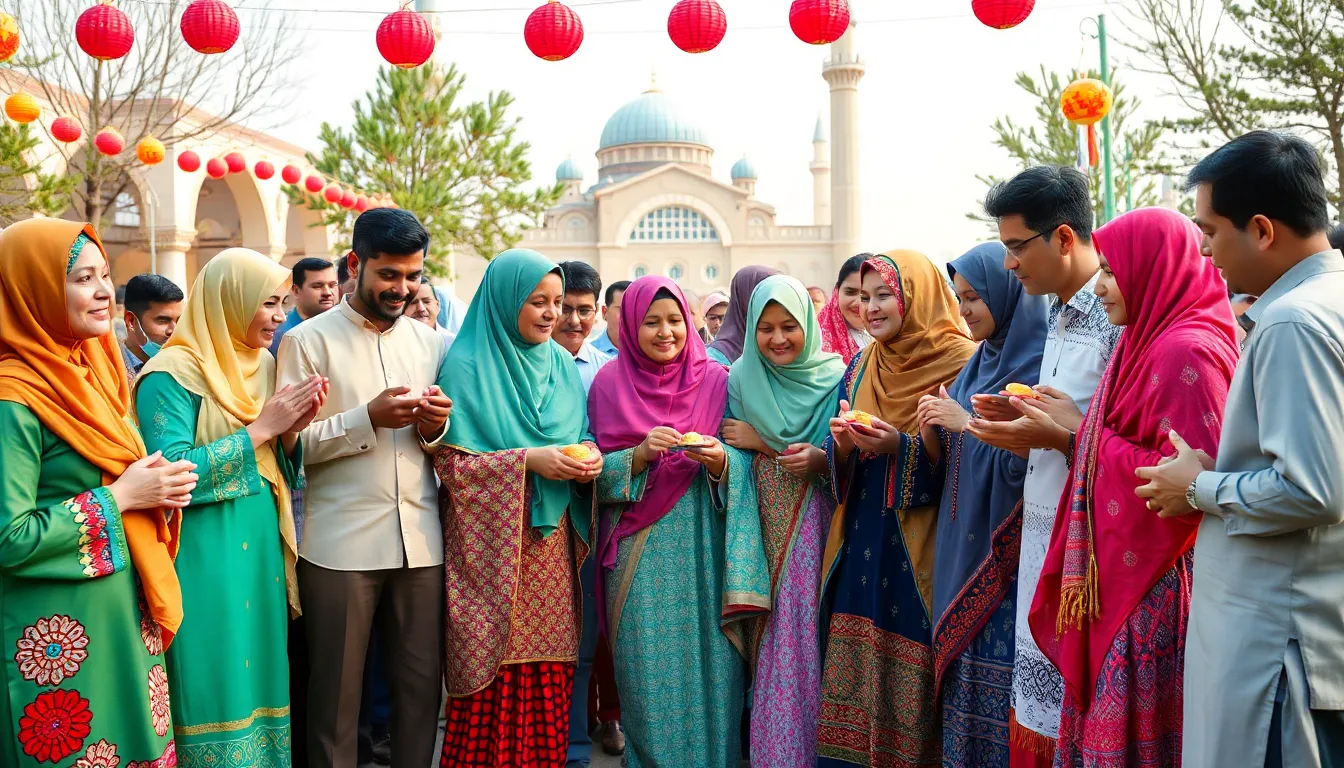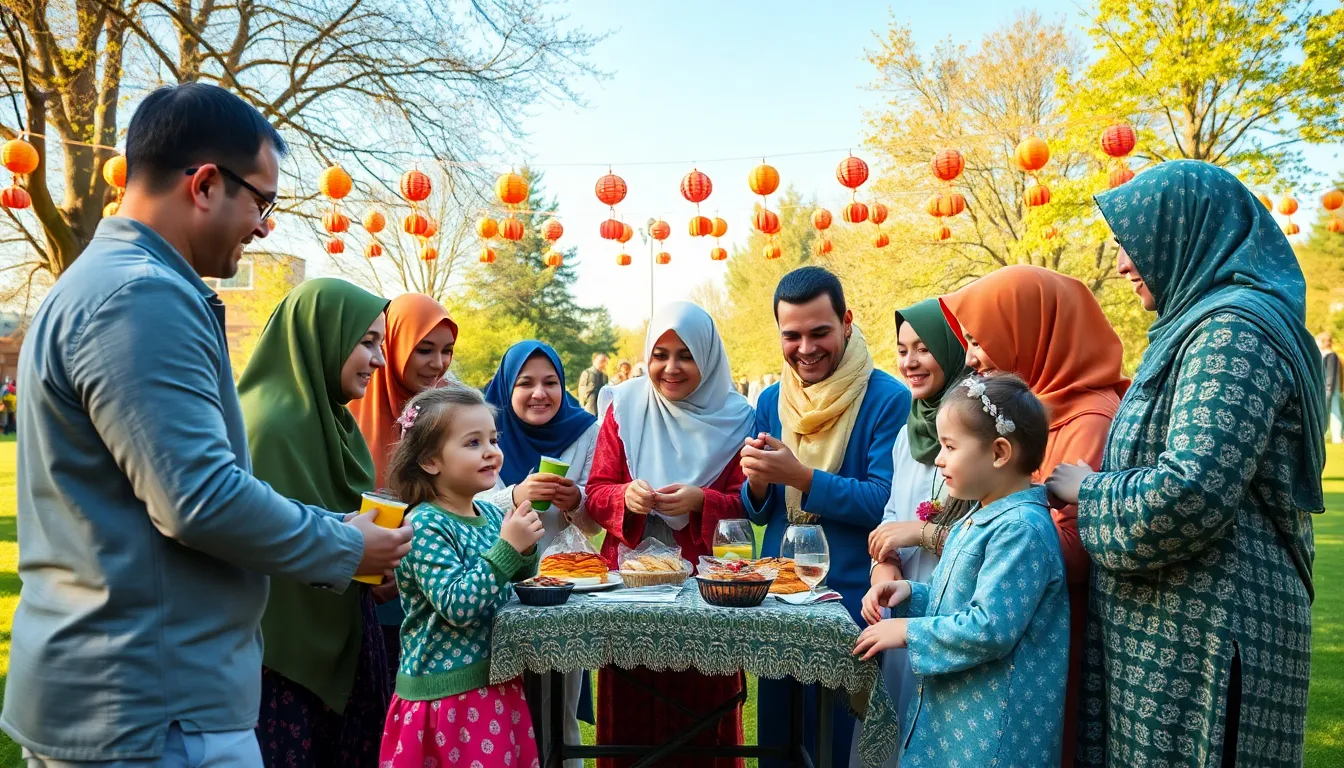As the holy month of Ramadan comes to a close, Muslims around the world eagerly anticipate the celebration of Eid al-Fitr. In Germany, where a vibrant Muslim community thrives, the date for Eid al-Fitr in 2025 holds special significance. Knowing the exact date allows families and friends to plan their gatherings, prayers, and festivities in advance.
Eid al-Fitr is not just a day of celebration; it symbolizes the end of fasting and spiritual reflection. In 2025, this joyous occasion will be marked by communal prayers, feasting, and acts of charity. Understanding the timing and cultural nuances surrounding this holiday can enhance the experience for both locals and visitors alike.
Table of Contents
ToggleSignificance Of Eid Al-Fitr
Eid al-Fitr marks the completion of Ramadan, a month dedicated to fasting, prayer, and reflection. This celebration holds profound significance for Muslims in Germany and worldwide. Families engage in communal prayers, usually held in mosques or open spaces, fostering a sense of community and unity.
Eid al-Fitr symbolizes gratitude for the strength shown during Ramadan’s fasting. Participants express appreciation for the spiritual growth experienced throughout the month. The holiday emphasizes charity, with practices like Zakat al-Fitr, a form of charitable giving, ensuring that those in need can also partake in the festivities.
The day is marked by feasting, with traditional foods varying by culture, reflecting local customs among the Muslim population in Germany. The celebration fosters family bonds, as relatives and friends gather to share meals, gifts, and experiences.
Eid al-Fitr not only encourages joy and celebration but also highlights the importance of forgiveness and renewal. It serves as a reminder to strengthen relationships and cultivate goodwill among all community members. Understanding this significance enriches appreciation for the cultural fabric of Germany’s diverse society.
Overview Of Eid Al-Fitr

Eid al-Fitr marks a significant festival for Muslims, celebrating the conclusion of Ramadan. The holiday fosters community bonding, reflection, and gratitude among families in Germany.
Historical Background
Eid al-Fitr has roots tracing back to the time of Prophet Muhammad, celebrated for over 1,400 years. The festival originated as a day to express joy after the month of Ramadan, which entails fasting from dawn until sunset. Historical texts indicate that Muslims were instructed to commence the festival following the sighting of the new moon, marking the end of Ramadan. Materials from Islamic scholars emphasize the spiritual significance of this day as a period of thankfulness for divine guidance and strength during the month-long fast.
Cultural Celebrations
Cultural celebrations of Eid al-Fitr in Germany incorporate local traditions alongside Islamic practices. Major activities include attending communal prayers held in mosques or public areas, drawing large crowds. Families often prepare special meals, featuring traditional dishes that showcase cultural diversity. Common practices include exchanging gifts and new clothing, symbolizing joy and renewal. Community gatherings encourage unity and inclusiveness, with many participating in charitable actions and donations, such as Zakat al-Fitr. Local festivals and events cater to the broader community, enhancing understanding and appreciation of diverse cultural expressions surrounding the holiday.
موعد عيد الفطر 2025 في ألمانيا
Eid al-Fitr in Germany is anticipated to fall on April 10, 2025, following the completion of Ramadan. Accurate marking of this date allows families to prepare for significant celebrations.
Expected Date
The expected date, April 10, 2025, aligns with the Islamic calendar, as Eid al-Fitr occurs on the first day of Shawwal, the month following Ramadan. The actual date may vary slightly based on moon sightings, which are significant in Islamic tradition. Communities in Germany typically prepare in advance, ensuring all necessary arrangements for joyous gatherings and prayers.
Islamic Calendar Influence
The Islamic calendar, a lunar calendar, affects the timing of Eid al-Fitr each year. Unlike the Gregorian calendar, which is solar-based, the Islamic calendar consists of 354 or 355 days. This discrepancy means Eid al-Fitr shifts approximately 10-12 days earlier each year in the Gregorian calendar. Consequently, locals in Germany can expect variations in seasonal celebrations annually. This calendar influence underscores the importance of moon sightings for marking the beginning of Eid al-Fitr, creating a culturally rich and dynamic observance within the community.
How Eid Is Celebrated In Germany
Eid al-Fitr in Germany serves as a vibrant expression of cultural and religious identity for the Muslim community. Celebrations encompass a variety of community events and cherished traditions that highlight the significance of this festive period.
Community Events
Community events play a critical role in Eid al-Fitr celebrations in Germany. Mosques organize communal prayers that gather thousands of people, fostering unity and shared devotion. Local organizations often sponsor open house events, inviting both Muslims and non-Muslims to participate in cultural exchanges. These gatherings include food fairs, cultural performances, and interactive workshops, enhancing understanding and camaraderie among diverse populations. Additionally, charity events raise funds and collect food for the underprivileged, ensuring that everyone can enjoy the festivities. Such events underline the holiday’s themes of gratitude, generosity, and inclusiveness.
Traditions And Practices
Traditions and practices during Eid al-Fitr reflect a blend of Islamic customs and local influences. Families begin the day with a special prayer at the mosque, often followed by the giving of Zakat al-Fitr, a form of charity that ensures those in need can celebrate the holiday. Traditional foods vary, showcasing regional specialties such as baklava, samosas, and various types of rice dishes, providing an opportunity for families to share festive meals together. Many children receive new clothes and gifts, symbolizing renewal and joy. Home visits among family and friends promote bonding and strengthen community ties. These practices enrich the celebration, emphasizing forgiveness, love, and mutual respect within Germany’s multicultural landscape.
Eid al-Fitr in Germany stands as a vibrant celebration that unites the Muslim community in joy and gratitude. The anticipated date of April 10, 2025, offers families the opportunity to prepare for meaningful gatherings and prayers. This holiday not only marks the end of Ramadan but also embodies the values of charity, forgiveness, and community bonding.
As families come together to share traditional meals and partake in cultural festivities, they reinforce their connections with one another and with the broader society. The significance of Eid al-Fitr transcends religious boundaries, inviting everyone to appreciate the rich tapestry of cultural diversity in Germany. Through communal events and charitable acts, the celebration fosters understanding and goodwill, enriching the community’s spirit.




